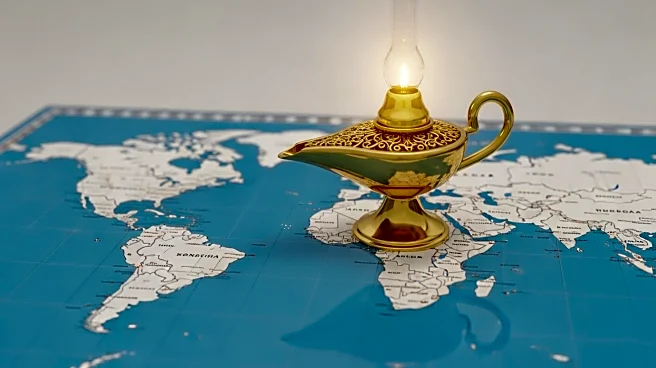What's Happening?
Saudi Arabia is undergoing a significant transformation in its strategic and foreign policy approach, as outlined in its national program, Saudi Vision 2030. Under the leadership of Crown Prince Mohammed
bin Salman, the kingdom is moving away from a posture of dependence on external protectors, such as the United States, and is instead seeking to diversify its strategic alliances and assert its influence in the Middle East. A key development in this shift is Saudi Arabia's deepened defense cooperation with Pakistan, a major Muslim nation with nuclear capabilities. This cooperation, while not a formal alliance, signals Saudi Arabia's intent to broaden its defense architecture and establish parallel channels of deterrence. The kingdom's evolving stance also includes the potential normalization of relations with Israel, contingent upon progress on the Palestinian issue and a long-term security framework with the United States.
Why It's Important?
The strategic realignment of Saudi Arabia has significant implications for regional stability and power dynamics in the Middle East. For Israel, the potential normalization of relations with Saudi Arabia presents both opportunities and challenges. On one hand, it could lead to the formation of a broad regional coalition to counter Iran, enhance Israel's diplomatic legitimacy, and open up avenues for economic cooperation in areas such as trade, energy, and technology. On the other hand, if Saudi Arabia continues to strengthen its defense ties with other Muslim nations without including Israel, it could lead to Israel's isolation in the region. The evolving Saudi-Pakistani defense relationship, even without nuclear implications, highlights the need for Israel to engage proactively with Saudi Arabia and the United States to ensure its strategic interests are safeguarded.
What's Next?
Israel faces a critical decision point in how it responds to Saudi Arabia's strategic shift. To capitalize on the potential benefits of normalization, Israel must move beyond a policy of observation and adopt a proactive approach. This involves coordinating closely with Washington, engaging directly with Riyadh, and proposing a realistic political and economic framework that facilitates cooperation. Failure to act decisively could result in Israel being sidelined as new regional security structures emerge. The coming months will be crucial for Israel to solidify its position and leverage Saudi Arabia's rise as a strategic asset.
Beyond the Headlines
The broader implications of Saudi Arabia's strategic shift extend beyond immediate geopolitical considerations. The kingdom's move towards a more diversified and assertive foreign policy reflects a broader trend of regional actors seeking to redefine their roles in a rapidly changing Middle East. This transformation is likely to influence the balance of power in the region, with potential ripple effects on global energy markets, international diplomacy, and security alliances. As Saudi Arabia continues to implement its Vision 2030, the outcomes of its strategic decisions will be closely watched by global stakeholders.










